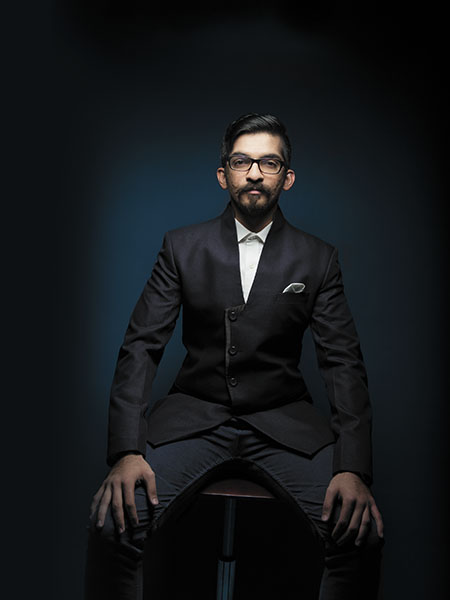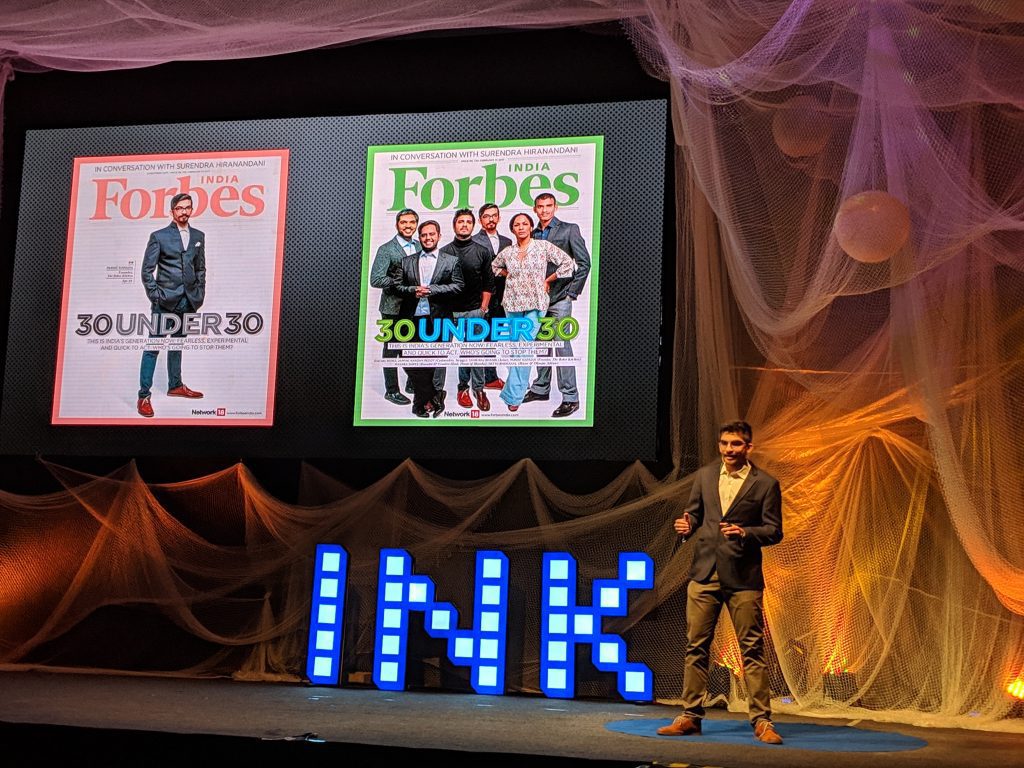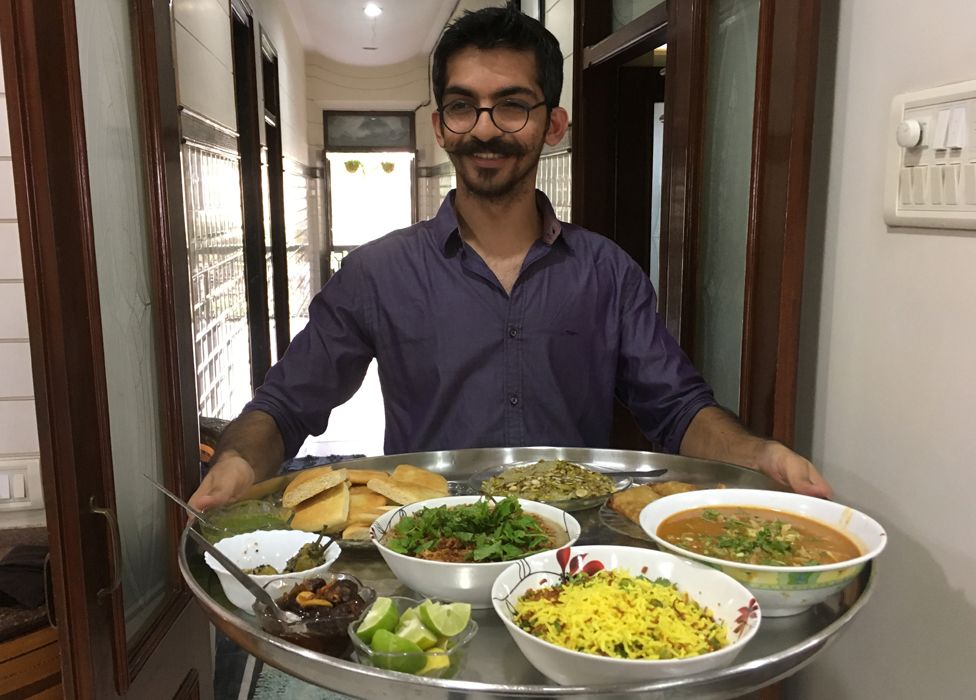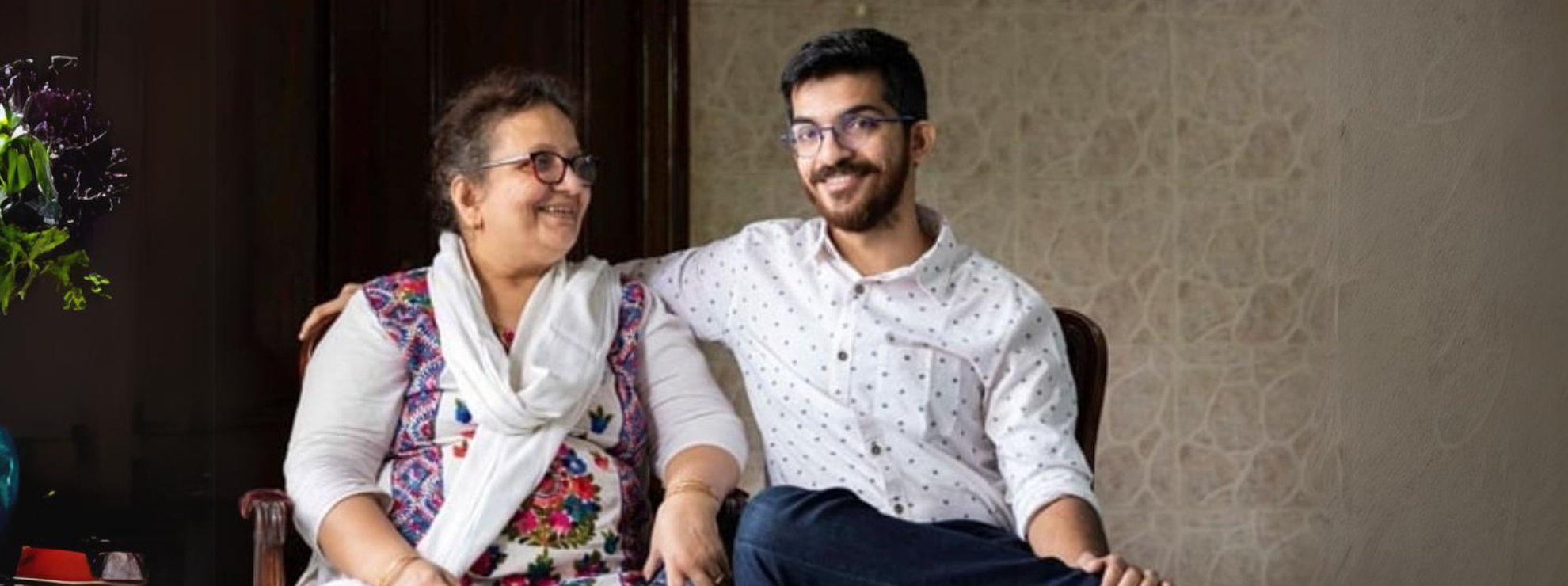(January 11, 2024) A few years ago, on an Air China flight from Beijing to the US, Munaf Kapadia’s brother unexpectedly saw their mother, Nafisa, on the in-flight screen, frying samosas with Chef John Torode at the Kapadia family home in Colaba. This was the moment when Munaf Kapadia felt he had arrived, bringing global attention to the rich culinary heritage of the small, little-known Bohra community. What started as a way to help his mum monetize her talent for cooking, and a chance for him to hone his social media skills, went on to spark a Bohri food revolution. TBK established its first outlet in Kamala Mills, achieved Top 10 status on TripAdvisor and was recognised as the “Best Bohri Food Restaurant” by Times Food Guide. He also made it to the Forbes 30 Under 30 list in 2017 and has been ranked among the top 50 food influencers in the country.

Munaf Kapadia. Photo: Forbes
Simply put, Munaf, a TED speaker and author of ‘How I Quit Google to Sell Samosas’, is a disruptor. Ten minutes into our interview, my list of questions suddenly seemed redundant. Munaf didn’t scale up The Bohri Kitchen, he scaled down. Although he was a marketing man, he didn’t pour funds into a strategy – he leaned into his network, stayed hyperlocal and created a logo on the fly, on PowerPoint. He didn’t throw open his doors to everyone, instead, guests had to request a seat and then go through a mandatory screening process before they received a confirmation, after which they would climb two flights of stairs without complaint to share meals from a communal ‘thaal’, leaving “with full stomachs and full hearts.” Instead of a complex long term strategy, he took things one step at a time. Instead of the conventional adaptation to fast-changing market trends, TBK has managed to stay true to its brand and grow organically, finding its niche in bulk and catering orders.
Now focused on living a life of purpose, is currently reviving The Dining Table, an aggregator platform for home dining experiences by Indian housewives, which he started up a few years ago and stalled. He has switched to a non-profit model now, determined to stick with his mission for empowerment. “If I can empower 100 housewives to have their equivalent of The Bohri Kitchen, I would have made a change,” he says. “My goals are women empowerment, developing culinary tourism and building communal harmony with food as a medium.” He’s also building MK Consulting, leveraging his diverse experience from Google, The Bohri Kitchen, McDonald’s (where he tripled the monthly delivery revenue from Rs 20 crore to Rs 60 crore in his role leading the delivery operations), and Zomato. “Our gency that will work with the largest restaurant chain in the country to guide them in every aspect of their delivery business optimization. I’m trying to create the first fast food e-commerce agency,” Munaf tells Global Indian.
Where it began
At the end of the 2010 placement season at Narsee Monjee Institute of Management Studies, Munaf Kapadia sat in a chilly, air conditioned classroom on campus, awaiting his turn with the company representatives. He didn’t know his purpose then, and like his peers, aspired to a management position at an FMCG MNC. “Very few of us knew what really motivated us,” he writes in his book. In 2011, he started working with Wrigley, and after just three months moved to Google, taking the forty percent paycut in his stride. He grew in his role, going from backend work to a client-facing role but still, he was restless. He found an outlet in weekend hustles, including starting a company called Stick It and Go, which made clever bumper stickers.
Then one day, as Munaf and his mother, Nafisa, quarrelled over the TV remote, he began to wonder if his mother, who now had grown children living independently and spent her day watching day-time soaps and playing Candy Crush, needed an avenue for her creative talents. Now, ten years later, he smiles, “I wanted to help my mom find her purpose and keep herself busy even though she was perfectly happy being idle. I thought, she sacrificed so much so I wanted to save her, even though she wasn’t asking to be saved.” He decided to monetize his mother’s culinary talents and since setting up a restaurant wasn’t feasible, he invited people home instead.
View this post on Instagram
That’s how TBK came to be – Munaf sent out an email to everyone on his personal contact list, inviting them to come home and eat a meal cooked by his mother. Responses came pouring in and on November 20, 2014, they had their first event. His father, who would have disapproved of asking guests at home to pay for their food, believed he was meeting a group of Munaf’s friends! And Munaf knew beyond doubt that The Bohri Kitchen had to be nurtured. To address the obvious safety concerns he crafted the ‘no serial killer policy’, where customers had to request a seat and go through a screening process (and some social media stalking) before they actually came home.
The vision problem
When he quit Google six months later, Munaf shifted his focus towards scaling The Bohri Kitchen, motivated by the absence of a monthly paycheque. Despite earning about Rs 3 lakhs monthly from weekly operations, with “beautiful profit margins,” he aimed for aggressive expansion – envisioning TBK at music festivals and pop-ups. However, efforts like a booze-friendly menu at a Pune music festival didn’t resonate, as the food, lacking his mother’s touch, fell short. Munaf realized that scaling beyond his mother’s home-cooked recipes was challenging, yet he remained determined to transition from a niche home dining experience to a broader catering and delivery venture.
Investing in a restaurant was still out of the question, especially without commercial hospitality experience. But food delivery apps like Swiggy and Zomato were cropping up and seemed promising. So they went from laying food out on a massive thaal to a Bento-box type of thaal-inspired offering. This meant setting up a kitchen and standardising the food. The latter was hard to do because his mum cooked with instinct, not with recipe books. He did manage to get the recipes written down, but even so, quality wasn’t consistent and Munaf was discovering that he was now eroding a brand that had taken ten years to build. Besides, he had begun to see that instead of giving his mum something to do, he was taking away her hard-earned hours of leisure.
The gamechanger moment
In December 2016, broke and contemplating closing The Bohri Kitchen, Munaf received an unexpected phone call. It was Forbes magazine, wanting to feature him on their 30 Under 30 list in 2017. He was to share the cover with the co-founders of Swiggy, designer Masaba Gupta and Olympian Dattu Bhokanal. Why, he wondered. His networth didn’t qualify him, surely. The response he received still makes him smile. They were choosing him for his social impact, for being on the verge of disruption. How could he shut TBK down when he has made it to the cover of Forbes, that would be “embarrassing.”

So he pushed on. And five tumultuous years after he began TBK, he learned an important lesson. “The Bohri Kitchen was never meant to be scaled,” he admits. “I made no money, but I learned this! When I started TBK as a home dining experience, I was thinking of what was good for TBK. But when I got into home delivery, that was for Munaf Kapadia.” In March 2020, Munaf stepped away from the operations of TBK and separated his own goals and ambitions from that of the company. “We realised, slowly, organically that we are good at catering and at bulk orders. It’s such a good feeling to know you don’t have to do business in crores.”
The Ikigai question
As TBK found its feet, Munaf Kapadia took up a role at Zomato. “Great job, crazy money, intersected what I was good at with what the company was doing, but I decided to quit,” he says. This decision led him to work with a leadership coach to discover his Ikigai – it has resulted in the revival of The Dining Table, which allows Munaf a platform to focus solely on social impact.

It has been a journey of self awareness and acceptance. Candidly admitting that leadership might not be his forte after all, Munaf says, “I delegated, found talent and gave that talent room to grow. I try to work with people who are good at managing themselves and I give the scaffolding, the SOPs, the money, the room to make mistakes. I’m still on this journey,” he says.
- Follow Munaf Kapadia and The Bohri Kitchen on Instagram.



